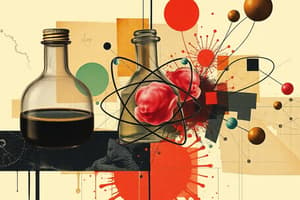Podcast
Questions and Answers
Which of the following is NOT a fundamental property of matter?
Which of the following is NOT a fundamental property of matter?
- Color (correct)
- Mass
- Occupies space
- Volume
What is the primary difference between atoms and molecules?
What is the primary difference between atoms and molecules?
- Atoms are made of protons and neutrons, while molecules are made of only neutrons.
- Atoms have a defined shape and size, while molecules do not.
- Atoms are electrically neutral, while molecules can be charged.
- Atoms are the basic units of matter, while molecules are formed by the chemical combination of atoms. (correct)
Which of the following is a characteristic of isotopes?
Which of the following is a characteristic of isotopes?
- Isotopes have different numbers of neutrons in the nucleus. (correct)
- Isotopes have different numbers of electrons orbiting the nucleus.
- Isotopes have different atomic numbers.
- Isotopes have different numbers of protons in the nucleus.
Which type of chemical bond involves the complete transfer of electrons between atoms?
Which type of chemical bond involves the complete transfer of electrons between atoms?
What is the relationship between the mass number (A) and the atomic number (Z) of an atom?
What is the relationship between the mass number (A) and the atomic number (Z) of an atom?
Which branch of chemistry deals with the study of energy changes in chemical reactions?
Which branch of chemistry deals with the study of energy changes in chemical reactions?
What does equilibrium constant (Kc) measure in a chemical reaction?
What does equilibrium constant (Kc) measure in a chemical reaction?
In a redox reaction, what process involves the gain of electrons?
In a redox reaction, what process involves the gain of electrons?
What determines the solubility of a substance in a solution?
What determines the solubility of a substance in a solution?
Which type of reaction involves balancing chemical equations and determining limiting reactants?
Which type of reaction involves balancing chemical equations and determining limiting reactants?




